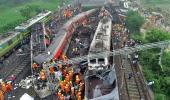The government will look to standardise rules around operations protocol during failure of automatic signalling.

In the aftermath of the Kanchenjunga train collision, where the automatic signalling system had failed due to lightning, the ministry of railways is considering streamlining protocols around signal failures on sections with automatic signalling, Business Standard has learnt.
The ministry has set up a committee comprising senior officials from departments concerning train operations in the railway board, who are reviewing subsidiary rules and regulations regarding protocols for station masters and train crew, such as loco pilot, guard.
Currently, rules regarding the protocol in case of failure of automatic signalling system are considered subsidiary rules, which means that the rules are only applicable to the zonal railway, and a certain level of discretion is allowed.
According to multiple officials privy to the developments, this could create scope for confusion for on-ground staff, even though the rules are on similar lines across divisions and zones.
In response to this, the government will look to standardise rules around operations protocol during failure of automatic signalling.
The committee was set up last week and is expected to table its report next week, 15 days after its formation.
At the time of the accident, both loco pilots of the Kanchanjunga Express and the goods train behind it had been issued a T/A 912 memo by the station master, which authorised them to pass the red signals.
A T/A 912 is issued when automatic signal systems fail on a particular route for a number of reasons.
Since the system is failsafe, the signal turns red, and the station master manually allows trains to pass, albeit at a restricted speed.
The Commissioner of Railway Safety is currently probing the accident.
According to the general and subsidiary rules of Eastern Railway, the loco pilot of the first train entering the affected section on Authority to Proceed, shall proceed with utmost caution and must not run at a speed exceeding 25 kilometres per hour, under any circumstances subject to other speed restrictions in force.
The loco pilot shall continue to look out for any obstruction until he reaches the station ahead, the rules say. In Andhra Pradesh, a rear-end collision in 2023 happened in similar circumstances.
Feature Presentation: Ashish Narsale/Rediff.com











